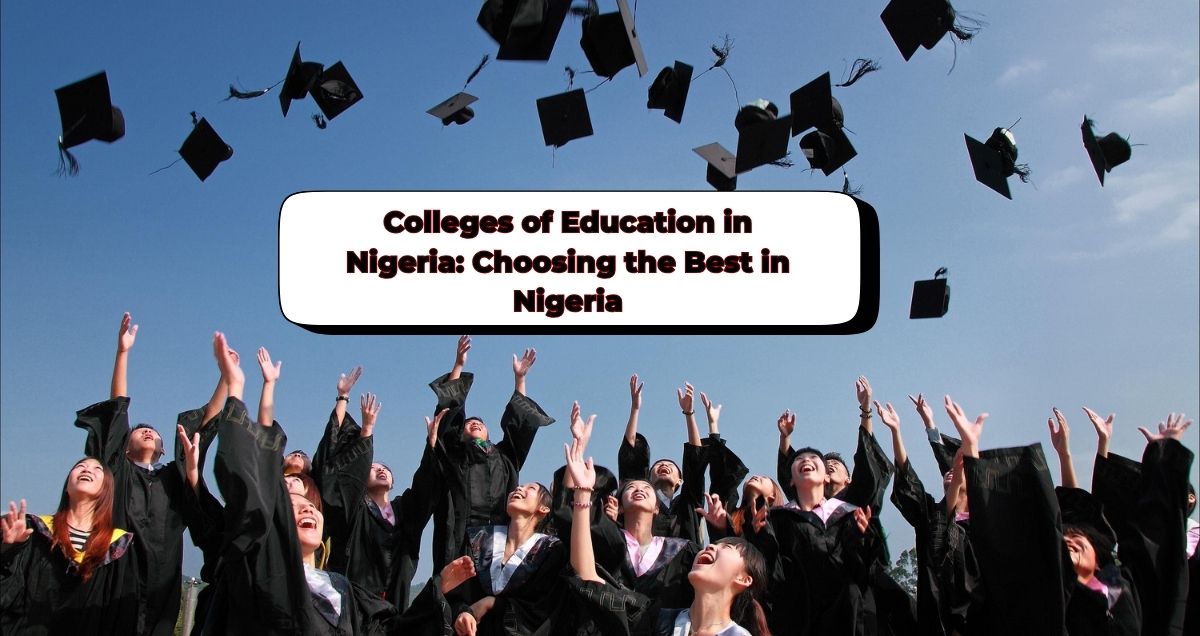
Colleges of education in Nigeria are key to launching a successful teaching career. With hundreds of institutions spread across the country—federal, state, and private—choosing the right one can be stressful, especially when you’re unsure about accreditation, costs, or course options.
As someone who went through this same journey after secondary school, I understand how confusing it feels trying to decide which path to follow. Questions like “Which college is accredited?”, “What will it cost?”, and “Will I get a job after graduation?” are common for anyone looking to study at an NCE awarding institution in Nigeria.
This guide is designed to help you make that decision with confidence. You’ll find the full list of colleges of education in Nigeria, admission tips, what programs they offer, and which ones are best suited for your goals.
Let’s get started with the basics you need to know before applying.
List of colleges of education in Nigeria
Federal Colleges of Education in Nigeria (27)
Federal colleges are government-funded and known for quality teacher training and affordable fees. Below are the accredited federal colleges:
- Adeyemi College of Education, Ondo – Ondo State (Affiliated with Obafemi Awolowo University)
- Alvan Ikoku Federal College of Education, Owerri – Imo State
- Federal College of Education, Abeokuta – Ogun State
- Federal College of Education, Eha-Amufu – Enugu State
- Federal College of Education, Iwo – Osun State
- Federal College of Education, Kano – Kano State
- Federal College of Education, Katsina – Katsina State
- Federal College of Education, Kontagora – Niger State (Est. 1958)
- Federal College of Education, Obudu – Cross River State
- Federal College of Education, Okene – Kogi State
- Federal College of Education, Pankshin – Plateau State (Est. 1974)
- Federal College of Education, Yola – Adamawa State (Est. 1974)
- Federal College of Education, Zaria – Kaduna State (Est. 1962)
- Federal College of Education (Special), Oyo – Oyo State
- Federal College of Education (Technical), Akoka – Lagos State (Est. 1967)
- Federal College of Education (Technical), Asaba – Delta State
- Federal College of Education (Technical), Bichi – Kano State
- Federal College of Education (Technical), Gombe – Gombe State
- Federal College of Education (Technical), Omoku – Rivers State
- Federal College of Education (Technical), Potiskum – Yobe State (Est. 1976)
- Federal College of Education (Technical), Umunze – Anambra State
- Federal College of Education (Technical), Gusau – Zamfara State (Est. 1990)
- Federal College of Education, Ekiadolor – Edo State
- Federal College of Education, Isu – Ebonyi State
- Federal College of Education, Odugbo – Benue State
- Federal College of Education, Omuma – Rivers State
- Federal College of Education, Zurmi – Zamfara State
State Colleges of Education in Nigeria (54)
State colleges are managed by state governments and focus on local teacher training needs. Below are notable examples:
- College of Education, Afaha-Nsit – Akwa Ibom State
- College of Education, Agbor – Delta State
- Akwa Ibom State College of Education, Etinan – Akwa Ibom State
- College of Education, Akwanga – Nasarawa State
- College of Education, Ankpa – Kogi State
- College of Education, Azare – Bauchi State
- College of Education, Billiri – Gombe State
- College of Education, Ekiadolor – Edo State
- College of Education, Gashua – Yobe State
- College of Education, Gindiri – Plateau State
- College of Education, Hong – Adamawa State
- College of Education, Igueben – Edo State
- College of Education, Ikere-Ekiti – Ekiti State
- College of Education, Ila-Orangun – Osun State
- College of Education, Ilorin – Kwara State
- College of Education, Jalingo – Taraba State
- College of Education, Kafanchan – Kaduna State
- College of Education, Kwararafa – Taraba State
- College of Education, Lanlate – Oyo State
- College of Education, Maru – Zamfara State
- College of Education, Minna – Niger State
- College of Education, Mosogar – Delta State
- College of Education, Nsugbe – Anambra State
- College of Education, Oro – Kwara State
- College of Education, Port Harcourt – Rivers State
- College of Education, Umunze – Anambra State
- College of Education, Warri – Delta State
- College of Education, Waka-Biu – Borno State
- Kano State College of Education and Preliminary Studies – Kano State
- Sa’adatu Rimi College of Education, Kumbotso – Kano State
- Tai Solarin College of Education, Ijebu-Ode – Ogun State
- Umar Suleiman College of Education, Gashua – Yobe State
Note: The remaining state colleges (up to 54) are spread across various states, including additional colleges in states like Benue, Cross River, and Enugu. Check NCCE for the complete list.
Private Colleges of Education in Nigeria (82)
Private colleges offer flexible admissions and modern facilities but have higher fees. Below are key examples:
- Al-Ibadan College of Education, Ibadan – Oyo State
- Al-Iman College of Education – Bauchi State
- Aminu Kano College of Education – Kano State
- Annur Institute for Islamic Education, Kano – Kano State
- Ansar-Ud-Deen College of Education, Isolo – Lagos State
- City College of Education, Mararaba – Nasarawa State
- COE College of Education, Edo – Edo State
- Cornerstone College of Education, Lagos – Lagos State
- Delar College of Education, Ibadan – Oyo State
- Emamo College of Education – Abia State
- Gand-Plus College of Education – Kwara State
- Havard Wilson College of Education, Aba – Abia State
- Innovative College of Education, Karu – Nasarawa State
- Institute of Ecumenical Education, Enugu – Enugu State
- Kin sey College of Education, Ilorin – Kwara State
- Murtadha College of Education, Oluyole – Oyo State
- Olekamba College of Education – Rivers State
- Royal City College of Education, Iyesi-Ota – Ogun State
- Sam Ale College of Education – Edo State
- St. Augustine’s College of Education, Akoka – Lagos State
- Topmost College of Education, Ipaja – Lagos State
- Yewa Central College of Education, Ayetoro – Ogun State
Note: The remaining private colleges (up to 82) include institutions in states like Anambra, Imo, and Kaduna. The NCCE website provides the full list.
READ ABOUT: Best Universities in Nigeria: Top-Ranked Schools
The Best Colleges of Education in Nigeria
What Are Colleges of Education in Nigeria?
Colleges of education in Nigeria are post-secondary institutions created to train professional teachers, especially for primary and junior secondary levels. These schools award the National Certificate in Education (NCE), which is the minimum requirement for teaching in Nigeria.
All reputable colleges are regulated by the National Commission for Colleges of Education (NCCE). As of 2025, there are over 205 accredited colleges of education across Nigeria, offering teacher training programs in subjects like Mathematics, English, Biology, Home Economics, and Technical Education.
If you’re searching for NCCE accredited colleges, this guide will highlight the ones officially recognized for quality teacher education in Nigeria.
How Many Colleges of Education Exist in Nigeria?
Based on the latest figures from NCCE:
- 27 Federal Colleges of Education
- 54 State Colleges of Education
- 82 Private Colleges of Education
- Additional NCE-awarding institutions, including Polytechnics and Innovative Enterprise Institutions
This breakdown shows how widely available NCE programs are across different regions. If you’re interested in colleges of education by state, you’ll see that each part of Nigeria is represented—from Lagos to Kano, Enugu to Sokoto.
So, whether you prefer a federal college of education in Nigeria for affordability or a private one for convenience, there are plenty of options to choose from.
Federal, State, and Private Colleges
What’s the Difference Between Federal, State, and Private Colleges?
Each category of college of education has its strengths and weaknesses. Here’s how they compare:
- Federal Colleges of Education: Funded by the Federal Government. These schools are often better equipped and offer lower tuition (₦20,000–₦50,000). For example, Federal College of Education, Zaria is popular for its long-standing reputation.
- State Colleges of Education: Managed by individual state governments. Fees are slightly higher than federal colleges, ranging from ₦30,000 to ₦70,000. Some, like Adeyemi College of Education, are highly respected.
- Private Colleges of Education: Privately owned, offering more flexible admission but higher fees (₦100,000–₦300,000). Schools like St. Augustine’s College of Education, Lagos, cater to students looking for customized schedules or better teacher-student ratios.
If affordability is your concern, you may lean toward a federal institution. But if you want a more tailored experience, a private college could be a better fit.
Top 10 Colleges of Education in Nigeria
While many schools offer quality education, some stand out for consistency, facilities, and graduate outcomes. Below are the Top 10 Colleges of Education in Nigeria for 2025:
- Federal College of Education, Zaria – Leading in research and affordable tuition
- Adeyemi College of Education, Ondo – Now affiliated with Obafemi Awolowo University
- Alvan Ikoku Federal College, Owerri – Rich in history and academic excellence
- FCE (Technical), Akoka, Lagos – Known for vocational and technical education
- FCE Kano – Strong regional presence in Northern Nigeria
- FCE Okene – Offers a wide range of courses and industry-standard labs
- FCT College of Education, Zuba – Ideal for students in Abuja and surrounding states
- Nwafor Orizu College, Nsugbe – Excellent for Arts and Social Sciences
- St. Augustine College of Education, Lagos – Well-structured private option
- College of Education, Ikere-Ekiti – Now upgraded to a university but still relevant for NCE programs
Each of these institutions is either federal, state, or private, giving prospective students various options based on budget and location.
Why Choose State or Private Colleges?
While federal colleges may be popular, state and private colleges have their own unique benefits:
- State Colleges: Often have strong local support and cater to regional needs. Adeyemi College of Education, for example, is state-run but has academic performance on par with many federal colleges.
- Private Colleges: These are ideal for students seeking smaller class sizes or flexible learning. A student named Sarah, for instance, shared how a private college allowed her to combine her studies with a part-time job, something she couldn’t manage at a federal school.
If you’re considering teacher training colleges in Nigeria and want something close to home or with more individual support, a private or state college may be the better option.
Admission and Requirements
How to Apply to Colleges of Education in Nigeria
The application process is relatively straightforward, but knowing each step in advance can save you time:
- Register for JAMB UTME: Use the correct institution code and course details.
- Sit for the UTME: Aim for a score between 100 and 140 (minimum varies by institution).
- Apply Directly to Your Chosen College: Visit their official website, such as fceiwo.edu.ng, to fill out post-UTME forms.
- Prepare Required Documents: O’Level results, birth certificate, state of origin, and passport photos.
Double-check with the college you’re applying to, as requirements may vary.
What Are the Requirements for NCE Programs?
To gain admission into an NCE awarding institution in Nigeria, you typically need:
- Five O’Level Credits: Including English and Mathematics
- JAMB Score: Minimum 100–140 depending on the school
- Age: Must be at least 16 years old
- Optional: Direct entry for holders of Teachers’ Grade II Certificate or equivalent
Some schools may require a post-UTME screening or internal exams. Always confirm on the school’s official page.
Are Colleges of Education in Nigeria Accredited?
Yes—but not all.
To verify accreditation:
- Visit the official NCCE website at ncce.gov.ng
- Check the published list of accredited colleges of education in Nigeria
- Look out for fake or unapproved institutions that operate without licenses
Only NCCE accredited colleges can award valid NCE certificates recognized by Nigerian educational bodies.
How Much Does It Cost to Study at a College of Education?
The cost of studying at a college of education in Nigeria depends largely on whether the institution is federal, state, or private:
- Federal Colleges: ₦20,000 – ₦50,000 per session
- State Colleges: ₦30,000 – ₦70,000 per session
- Private Colleges: ₦100,000 – ₦300,000 per session
Beyond tuition, students also pay for registration, accommodation, books, and sometimes departmental dues. When budgeting, it’s important to account for these extras.
Some students also benefit from scholarships or state bursaries, especially those attending NCCE accredited colleges in their region.
What Courses Can You Study in Colleges of Education?
Most colleges offer a broad range of NCE programs in Nigeria. Here are popular options:
- English Language Education
- Mathematics Education
- Early Childhood and Primary Education
- Integrated Science
- Business Education
- Technical Education
- Special Needs Education
- Agricultural Science
- Christian Religious Studies
- Home Economics
If you’re wondering which college of education is best for English, for example, institutions like Alvan Ikoku and Adeyemi College have strong language departments with modern teaching resources.
Your choice should reflect your passion and future teaching goals.
What Are the Career Prospects After an NCE?
Graduating with an NCE opens several doors, especially in the education sector. Here’s what to expect:
- Primary and Secondary School Teaching: Many public and private schools accept NCE holders.
- Further Studies: You can apply for direct entry into a university to earn a B.Ed or B.A.Ed.
- Private Sector Opportunities: Educational NGOs, coaching centers, and tutoring platforms also hire NCE graduates.
- Government Jobs: Programs like SUBEB, TETFund, and N-Power Education favor NCE graduates for postings and grants.
Take John, for instance. After completing his NCE in Technical Education at FCE Akoka, he started working at a vocational school and later earned a B.Ed in Industrial Technology. He now trains young people on practical skills for employment.
How to Choose the Best College for Your Goals
Not all colleges of education are the same. Here’s what to consider when making your choice:
- Accreditation: Make sure the school is recognized by NCCE.
- Location: If you’re based in Lagos or the South-West, colleges in that region may be more convenient.
- Program Strength: Some schools are stronger in specific fields like Science, Languages, or Vocational Studies.
- Cost: Compare tuition and extra fees, especially if funding is limited.
- Facilities and Staff: Check whether they offer modern libraries, labs, and experienced lecturers.
If you’re looking for colleges of education in Lagos or the South-East, institutions like FCE Akoka and Alvan Ikoku College offer reliable programs with good support systems.
Where Can You Find These Colleges?
To help you make a better choice, here’s how some top colleges are distributed across the country:
- North: FCE Zaria, FCE Kano, FCE Okene
- South-West: Adeyemi College, FCE Akoka
- South-East: Alvan Ikoku, Nwafor Orizu
- South-South: College of Education, Warri
- FCT Zone: FCT College of Education, Zuba
- Private Options (Nationwide): St. Augustine’s (Lagos), Muftau Lanihun (Ibadan)
So whether you’re looking for colleges of education by state or region, there’s always one nearby with NCCE accreditation.
FAQs
What is an NCE, and why is it important?
The National Certificate in Education (NCE) is the minimum qualification required to teach in primary and junior secondary schools in Nigeria. It’s recognized by both federal and state education bodies.
How long is an NCE program?
Typically, NCE programs run for three years. Some colleges also offer sandwich or part-time options that take longer.
Can I pursue a degree after NCE?
Yes. With an NCE, you can apply for direct entry admission into a university’s B.Ed or related programs.
What’s the best college for Mathematics Education?
FCE Zaria, FCE Kano, and Alvan Ikoku are strong in science-related education, including Mathematics.
How do I verify a college’s accreditation?
Visit ncce.gov.ng and look under the “Accredited Colleges” section. Only listed institutions are authorized to issue valid NCE certificates.
Conclusion
This guide has covered everything you need to know about choosing the best colleges of education in Nigeria—from the full list of colleges to how to apply, tuition fees, NCE program options, and even career prospects after graduation.
If you’re still unsure where to begin, a good first step is to visit the NCCE website or the official site of any college mentioned in this article to learn more and get your application started.
Got questions or personal stories to share? Feel free to drop them in the comments and help others who are on the same journey.






